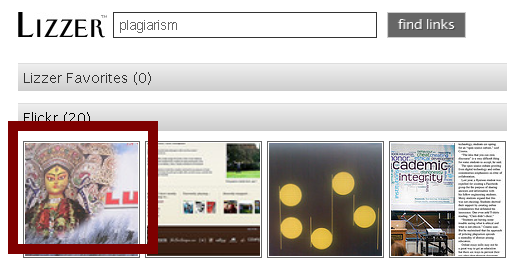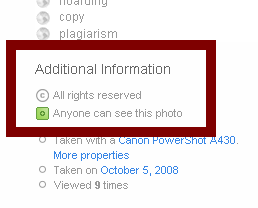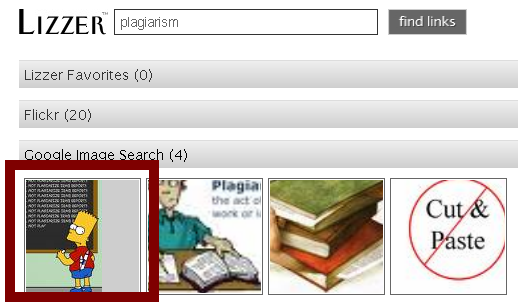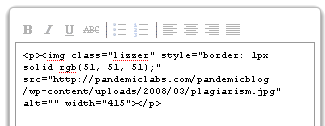Lizzer: A Copyright/Hotlinking Disaster
 I’ve always felt that improving the plagiarism/content misuse climate on the Web has been a two-pronged fight. First you have to stop the scrapers, plagiarists and other bad guys from ripping off writers and artists. Second, you have to create ways that legitimate users can access and share content that benefit both the artist and the user.
I’ve always felt that improving the plagiarism/content misuse climate on the Web has been a two-pronged fight. First you have to stop the scrapers, plagiarists and other bad guys from ripping off writers and artists. Second, you have to create ways that legitimate users can access and share content that benefit both the artist and the user.
As part of the second approach, I make it a point to seek out and highlight services that assist and encourage the legal reuse of content. In fact, on Monday I wrote a column for the Blog Herald detailing five sites/services that can help bloggers get images for their posts.
However, when I found out later that day about a new service called Lizzer, which supposedly “is the easiest way to add links and embed content on the Web” I was initially very excited. But as I used the service and saw first hand how it works, my optimism turned to horror as I realized that Lizzer does not enable legitimate reuse of images or content, but rather, encourages both copyright infringement and image hotlinking.
Lizzer, sadly, shares very little in common with the services that I featured in my Blog Herald article and, instead, gives Webmasters, especially those who work with images, a lot of reason to worry.
All Rights Reserved
When I first logged in to my new Lizzer account, I instantly noticed an issue with the service. From the very first page load I could start searching for content. But, while most of the content was innocent, YouTube embeds and links to articles, one of the options was to use a Flickr search.
While that sounds great, without knowing what licensing terms I wanted, the service had no means of telling which images I could use legally. As such, I knew that there was a decent chance it could return images not appropriate for my sites.
Still, I performed a search for the term “plagiarism” and opened up the Flickr dropdown. Below is a snapshot of what I saw, notice the first image, which is highlighted.

It seemed odd to me because I’ve done a similar photo search using Photo Dropper, which filters for my CC licenses, and have never seen this image in the results. After clicking the “Preview” button followed by the “Source” link, I was able to see why. I was taken to this page, where, at the bottom, I saw the following copyright notice.

The image is “All Rights Reserved” and is marked so clearly in the Flickr API. This image should never have appeared in these search results as embedding it could land a Webmaster in trouble should the owner of the image decide to complain.
However, Lizzer wasn’t done. There were still other features to explore and the worst was yet to come.
Hotlinking from Google Image Search
Though the Flickr issue seemed serious to me, it only affected a small number of photographers and artists, namely those who post all rights reserved images to Flickr, and, since Yahoo! was paying the bandwidth tab, it seemed unlikely many would complain.
However, as I looked through the service’s options, I noticed that I had the ability to add Google image search. I immediately cringed because I know well that the vast majority of images displayed in Google Image Search are protected by copyright. Though Google itself is protected by fair use, it is unlikely that any full-sized use of the content by a user of Lizzer would have the same benefit.
I performed a similar search for “plagiarism” and opened up the Google Search list. The results I saw are below. Again, pay attention to the first image, the highlighted image of Bart Simpson.

I once again followed the image to the source and was then taken to this page. Once again, there was no mention of Creative Commons or any other license to use the image. From a legal standpoint, copying and pasting the whole image is potentially very dangerous (Note: I’m completely ignoring the use of the copyrighted character in this work and treating it as a wholly original image for the sake of originality).
However, the real surprise came when I used the fake blog post to try and embed the image. Clicking the link caused the image to appear in the post, exactly as planned, but then I looked at the code that the embed feature created. I saw the following:

The image, as you see below, is hotlinked straight from the original server, in this case, pandemiclabs.com.
In addition to raising a series of issues about copyright infringement and content misuse, we now also have to worry about abuse of resources. If I were to actually use this image code, not only would I be using the image without permission, but I would be using their bandwidth and server resources to do it.
Obviously, a lot of Webmasters are not going to be happy about this. Not only is Lizzer making their content available for use when no license was granted but, in many cases, is encouraging bloggers to hotlink images straight from the original server without permission. The worst part is that, someone using Lizzer, might think that the service is like Photo Dropper or Zemanta and that they have permission to use everything they see.
Clearly though, that is not the case.
Defending Lizzer
In Lizzer’s Defense, the service is currently in alpha and the version that you see today will likely change before the final release. However, a bookmarklet is already available for wide use and works well with all major blogging platforms, including WordPress, Blogger, MovableType, Tumblr, etc. This means that Lizzer is currently in use by at least some bloggers, many of whom are likely unaware of the copyright issues.
Fortunately though, most of Lizzer’s functionality is centered around finding links and videos to embed. Due to the way YouTube sets up their service, disabling embedding is easy for those that chose to do so, an issue that Flickr has not been able to address.
Out of all the search features they offer, only the Flickr search and the Google Image search seem to have any serious issues. However, they are pretty big problems that are both very easy to see and even easier to avoid. Flickr offers an API that allows you to look for CC-licensed work and there are many ways to search for licensed images.
I’m not going to be so bold as to say that finding licensed images is a “solved problem” but it is clear to me that Lizzer is a step backwards from well-established solutions.
However, what is most disconcerting to me is that I emailed Lizzer on Monday to raise these issues. At that time, the Google Images search feature was not working correctly and the hotlinking issues were not present. Unfortunately though, as of this writing, no one has written me back and the Google Image search function has come back online.
Though I grant that Lizzer is currently very buggy, I experienced multiple issues trying to take these screenshots, it is more than usable and that is bad news for content creators, especially those who work primarily with images.
Conclusions
The simple truth is that Lizzer, in its current form, is very dangerous both for Webmasters who publish content and its members that use Lizzer to find content to embed. With so many great tools already available for finding and embedding licensed content, Lizzer not only seems risky to use, but also dated.
Hopefully Lizzer can correct these issues and make itself a respectable content location tool. However, in its current form it not only misses many of the best sources of licensed material, but leads users to embed things that they do not have the right to.
There simply is no reason to use Lizzer right now, there are much better services available. Granted, Lizzer is in an alpha state, but it has already shown a great deal of disregard for Webmaster content and the legal safety of their service.
Unfortunately, in my experience, these aren’t so much “bugs” as they are flaws in the thinking of the developers. Thus, they are much harder to fix.
Hopefully though, they will be able to resolve these issues, for their sake and ours.
Want to Reuse or Republish this Content?
If you want to feature this article in your site, classroom or elsewhere, just let us know! We usually grant permission within 24 hours.
